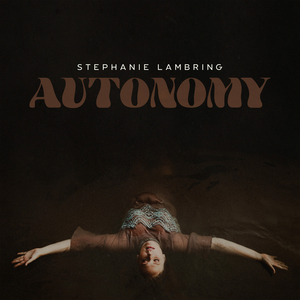Stephanie Lambring Releases 'Autonomy'
The ability to make your own decisions—to truly own the course your life takes, is a freedom that can take a while to embrace.

The ability to make your own decisions-to truly own the course your life takes, is a freedom that can take a while to embrace. Five years after she walked away from her publishing deal, singer-songwriter Stephanie Lambring has returned to make an album on her own terms, titled Autonomy, out today.
The topics Lambring covers on Autonomy can be heavy, but are approached through a lens of someone trying to reconcile their feelings about it all. It sounds familiar, like things you've thought about before, from childhood embarrassments that still pop up now and again to relationships that were bad choices from the beginning, from the constant desire to (still) please parents, to what in the world it feels like to try and understand evangelical Christianity in the current iteration of America.
After spending five years on Music Row learning the craft of songwriting, Lambring realized she was no longer writing for herself and walked away. She went to bartending school. She got a job waiting tables. She crisscrossed the country, adorning her fridge with a collage of national park magnets. With music on the back-burner, she trusted that everything would work out as it should-and slowly came back to writing. After a chance encounter with producer Teddy Morgan, she decided it was time to make an album saying what she wanted, and Autonomy began to take shape.
Album opener "Daddy's Disappointment" was the first song written for the album, when, after hearing Lambring hadn't written anything for over a year, Grammy-winning songwriter Tom Douglas challenged her to write a song in two weeks. "Pretty" dives into complex emotions stemming from her childhood, with Lambring's "piercing vocals [leading] the delicate track through affecting lyrics," according to American Songwriter. The song tackles body image and the kind of insults that stick in the back of your mind, ready to show themselves again when you're at just the right level of vulnerable for them to still sting.
"Little White Lie" discusses the dissolution of a marriage that perhaps was never really meant to be in the first place. Atwood Magazine said, "There are weddings and heartbreak in countless country songs, but most writers don't wield the kind of patient subtlety that Lambring does."
"Mr. Wonderful," is a window to the highs and the haze of a controlling relationship, from the fairytale beginning to the exhausting end. AudioFemme noted Lambring's "poetic and evocative" lyrics on the track.
Album standout "Joy of Jesus" is the product of spending years inside the church- and still struggling to find the feelings that are supposed to accompany the phrase. Lambring wrote the song after talking with a friend who was relentlessly harassed on the internet by the same person who told her to find Jesus and repent.
"Fine," dubbed "an empowering Americana anthem that embraces self-drive and independence" by PopMatters, examines adulthood-it's about skipping societal timelines, but still having to explain that choice at every twist and turn. Both "Somebody Else's Dress" and "Save Me Tonight" continue the theme of examining rigid adherence to religion.
Album closer "Birdsong Hollow" was inspired by a breathtaking valley on the Natchez Trace Parkway, about half an hour southwest of Nashville. Stretching over the valley is a double arch bridge, with a haunting sign: "There is still hope. Call anytime."
Within its 10 tracks, Autonomy is what it says it is-Lambring coming to terms with what her life and her world are made of. She asks listeners to take a moment and think about what makes them, and everyone who surrounds them, so human. The scars, the fears, the doubts, the resolution and the lights at the end of the tunnel.
"Everything is a little less worse when someone sees you like a person," she sings in "Old Folks Home." And that is what it's all about.
Listen here:
Comments

Videos

